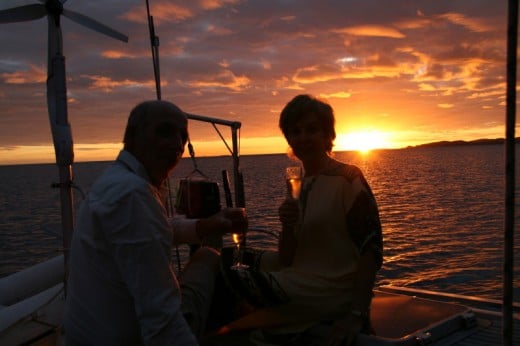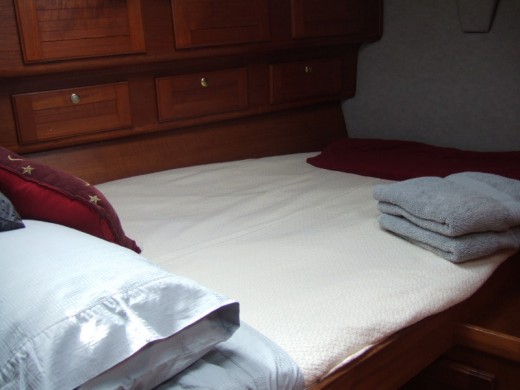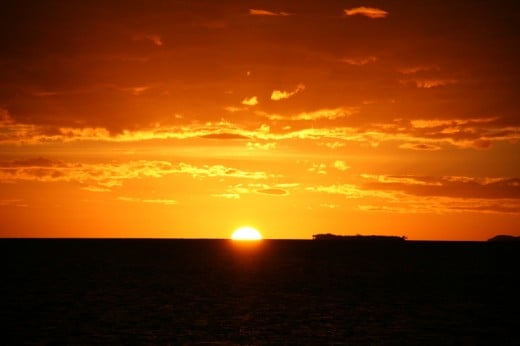Separating not from knot and more confusing boating words
Boating and sailing cruising is one of those alluring forms of transportation and recreation but it’s an activity which is loaded with strange terminology. If landlubbers (people like me who live on land and rarely or never venture onto the sea) can master some of the key terms it may help when go sailing cruising and asked to do something on the boat (on board).
Sailing cruises are slow, quiet and are generally an eco-friendly form of transportation.
It’s something I love to do and welcome any opportunity to participate in life on the water. However, when I first took sailing cruises there were a few pitfalls regarding the language.
Once on board if the owner (skipper) asks you to hand him/her the sheets, you could be forgiven for going downstairs (down below) to get the sheets off the bed (bunk). What the skipper actually wanted was for you to pass the ropes (sheets)!



The skipper is responsible for all on board. Theirs can be heavy burden. I try to listen carefully to the instructions of the skipper or his (they are often male) and first mate (wife partner, friend etc) as their word is “the law”. When on the boat if something doesn’t feel or sound right, or I am flummoxed, then I call for guidance because it’s not advisable to persevere with it. There is simply too much that can go wrong, and if it does, it can be expensive to fix; sometimes perilously expensive. Some problems can even put the lives of you and the others on board at risk.
If you are sailing cruising or anchoring somewhere away from the car park (marina) or mooring (where the boats tied up), it may not be possible to fix a problem, or pop up the road to the shop (chandlery).
Whenever I am on board, I like to spend time in the kitchen (galley) to cook some of the food. It’s a compact space, but many boats I’ve on been have many of the usual appliances. You just need to utilize that area well and I like that challenge that brings.
The head is one of those areas that may not operate as it’s supposed to and has caused much embarrassment to guests. The head is where you go to the toilet or bathroom. Don’t even get me started on how you pump out the waste. When it works its great, but if it doesn’t work properly then it’s a problem. If, after “doing your business” something goes wrong with the pump then you must ask the skipper or skipperess (my term not a nautical one – however, on reflection, I like it and reckon it should be added to the yachting lexicology). Back to the point regarding the head not working properly – the skipper or skipperess will have to either give you verbal instructions about what to do to empty the waste or horrors, come and fix it. Not a situation you want too often! It’s the one area when on board I stress over.
Pre-dinner drinks on the back-porch (after-deck) are a particular joy, especially when shared with friends after a days sailing crusing on the blue (ocean). It’s even better if you are lucky enough to enjoy drinks when the sun going down turning the sky all shades of red, orange and eventually blue-black.
If a boating person says it was difficult to get over the bar, do not, for one second think they are talking about a bar ala the place you might go to have a cold beer or the fixture in the Cheers television program. The bar refers to the mouth of the river where it silts up with sand.
Once dinner is ready, if the weather is suitable, it can be eaten in the cockpit sitting on the cushions (squabs) under the umbrella (sun cover). But if the weather is inclement, it’s too hot or the mozzies are the size of flies, it might be eaten in the dining room (saloon).
Port is the left of the boat when looking forward (the pointy end at the front) and starboard is the right.
If you are lucky enough to be invited to stay overnight, you might have the front room (forward cabin) or a bed (bunk) in the back room (aft cabin). You may even be invited to sleep in the lounge room (saloon).
It’s so snuggly sleeping on board. If you have your own space to put clothing in the chest of drawers (lockers) or in the wardrobe (hanging locker), then you are probably staying a few nights.
The front is the bow, the rear the stern, windows are hatches, knot applies to speed and the balustrade is the life lines! The terms landlubbers may encounter when sailing cruising are almost limitless. Most skippers and first mates are, in my experience, happy to share their love of this slow form of transportation, their boats and their love of the sea with landlubbers.
**Words and photos are copyright Travelespresso. Please respect my work and if you wish to use them, ask me.**

A few more Travelespresso Hubs
- New Wine Knowledge Excites but Will it Bore?
Wine classes have helped this wine lover to identify aromas and separate out some of the myriad of complex flavors in a glass of wine. It's been a revelation. In earlier years, Id been perplexed by the analysis and information wine buffs got from a - Scenic Flying - How It Used to Be in the 1940's
The scenic flight cruised slowly over the sprawling city of Auckland, its magnificent sparkling harbor beautifully laid out below us. We're passengers in a DC3 aircraft restored by enthusiasts - she's an ex commercial aircraft and served in the war. - Children: It's the Circle of Life
Raising boys as a single woman can be challenging. Who will they "mirror" to develop their unique maleness, who will they model for relationships? These are concerns to be overcome when raising boys to men alone so the circle of life can continue.




